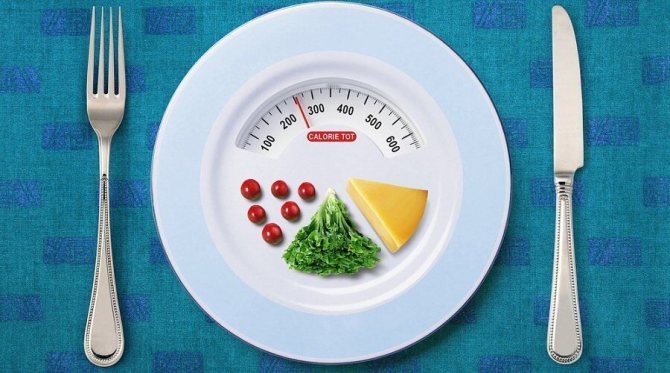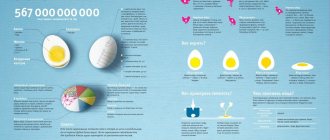The calorie content or energy value of food is one of the most important characteristics of food. It is determined by the amount of energy that the body receives when the components included in the food consumed are fully absorbed.
A person’s daily caloric intake depends on age, weight, height, gender, lifestyle, and is determined by the body’s energy expenditure on various types of activities. The minimum amount of energy required to ensure normal functioning of the body in women is less than in men - by about 15-20 percent.
Article on the topic Free Diet. How to lose weight without limiting yourself
Basics of Dietetics
Dietetics is the science of proper nutrition. The essence of energy balance is as follows:
- The intake of food into the body must be equal to its consumption.
- Food must contain carbohydrates, proteins and fats in the prescribed proportions.
- It is imperative to have vitamins and microelements in your daily diet.
If a person does not receive enough natural active substances, he begins to develop various diseases (hypertension, obesity, diabetes and others), which leads to a decrease in average life expectancy.
Balanced diet
To know how many calories you can consume per day, you need to know your energy expenditure (metabolic rate). The general metabolism in a person depends on the main and additional ones.
Basic metabolism is the number of calories the body expends to perform all important functions. How many calories a person normally needs per day depends on the main metabolism and the following factors:
- floor;
- weight;
- height;
- body constitution;
- level of hormone production.
Accordingly, the calorie intake per day depends on the listed criteria. For example, in men, chemical processes in the body occur faster than in women. Young people spend more energy than older people. The average daily metabolism in the adult population is 25 kcal per kilogram of weight.
How much protein should a person consume per day to be healthy? Athletes and active young people should consume 1.5-2.5 grams of protein per 1 kg of body weight per day. A person weighing 80 kg can eat 200 grams of protein daily. People with moderate activity can consume up to 1.5 grams per 1 kg of body weight. If you have a sedentary lifestyle, then it is enough to eat up to 1 gram per 1 kg per day.
Drying the body
Drying the body is a set of actions, the implementation of which reduces the percentage of fatty tissue in the body, maximizes muscle relief, and also burns subcutaneous fat.
Drying the body for girls and men consists of cutting carbohydrates in the diet, drinking more water, increasing the consumption of high-protein foods and sports nutrition.
According to the advice of experienced nutritionists and trainers, to saturate the body with useful elements with protein, it is necessary to consume vegetables and fiber, as they combine perfectly and enhance the absorption of each other.
To create the correct diet, you should calculate your nutritional intake online using a calculator. Thus, you can find out not only your individual calorie needs, but also the required ratio of proteins, fats, carbohydrates, based on the goal being pursued.
Application of knowledge about proper nutrition and diet planning is one of the main factors influencing the process of weight loss. The effectiveness of losing weight depends on many circumstances, but only a comprehensive approach to the existing problem will help solve it effectively.
Where do calories come from?
As mentioned above, food contains carbohydrates, fats, proteins, vitamins, microelements and water. The last three components do not provide energy to the body. The calorie content of food is expressed in the energy value necessary to maintain life in the human body.
The human body consumes food to perform a variety of functions, such as heat generation, respiration, blood transport through cells, for rest and work, and sports. If a person consumes more than he expends, then some of the calories are stored as fat, and the person gets fat.
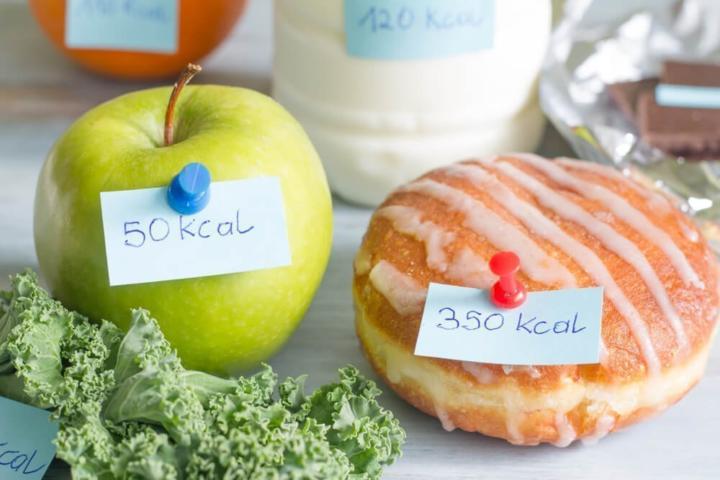
The importance of food in metabolism
Food is the main source of fuel for the human body. All processes of digestion, assimilation and removal of decay products take place with the participation of two more necessary components: air (oxygen) and liquid (water).
The quality and quantity of food, its balanced composition allow you to maintain proper metabolism. Its violation can lead to serious negative consequences for the entire body.
The main ones:
- weakness and increased fatigue;
- high or low blood pressure;
- tachycardia;
- exhaustion;
- overweight;
- development of atherosclerosis;
- avitaminosis;
- hypoxia;
- development of diabetes.
In addition to proteins, fats and carbohydrates, microelements and vitamins play an important role in the process of digestion and assimilation of substances. They are not included in the structure of the tissue, but are extremely necessary for healthy life and high-quality functioning of all systems and organs of the human body.
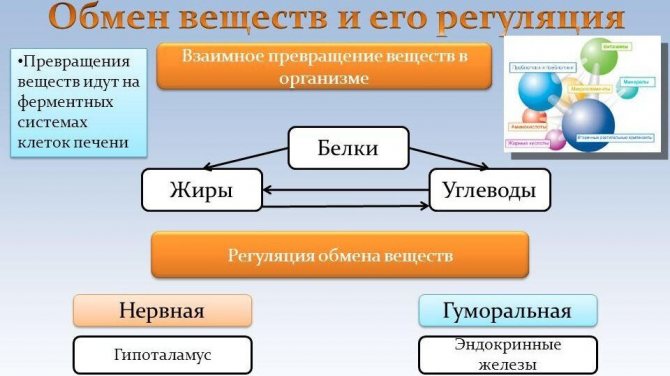
What happens when you don't have enough calories?
When calculating the daily norm, you need to take into account every little thing: putting butter in porridge or mayonnaise in a salad. An excess of calories, just like a deficiency, is fraught with consequences for the body. If there are few nutrients coming from food, the body begins to use energy from muscle tissue rather than from excess fat.
Lack of fats and carbohydrates in the diet can reduce basal metabolism. The body, maintaining a constant supply of sugar to the brain, uses up its own supply of glycogen, which is stored in the liver. Glycogen is gradually removed from muscle tissue, and as a result, a person begins to lose weight. If reserves are depleted, a person stops losing weight.
Fat tissue is not used to nourish the brain. During the period of weight loss, the body uses fat deposits as energy, but the decrease in these reserves is much less than the loss of muscle and bone tissue. If a person deprives himself of fatty foods during a diet, then weight loss occurs due to bone and muscle tissue. This is fraught with danger for the body, as it threatens exhaustion.
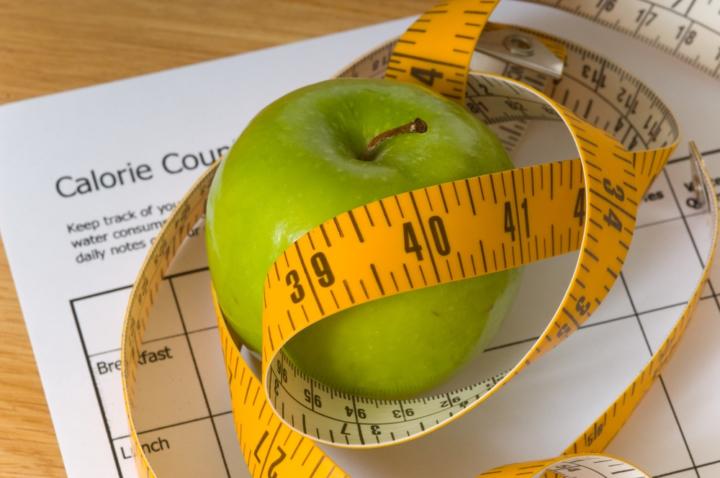
What is a calorie
The energy received by the body during food processing is spent on all life processes: growth, physical and mental work, games and entertainment. Even in a state of rest (for example, in sleep), its expenditure is necessary.
A person needs to restore spent energy. To do this, he eats food, after which metabolic processes (metabolism) begin to occur in the body.
The energy (heat) released in this case, like any other, has:
- numerical expression;
- letter designation;
- calculation formula for the need for it for each specific organism.
This conventional unit - the calorie - was invented and announced to the general public by the French chemist Nicolas Clement Desor (1779-1841) in 1824. It got its name from the Latin word “calor” (in transcription “calor”) - heat (Russian).

History of discovery
In the mid-18th century, the Englishman Joseph Black invented the first instrument for measuring the heat released when ice melts (latent melting point) and the heat capacity of various substances.
Later, work on improving the methods and the device itself was continued by the French scientists Lavoisier (second half of the 18th century) and Mercelin Berthelot (second half of the 19th century), who improved and modified the device, giving it the name “water calorimeter.” Much work has also been done on thermochemistry and improving methods for determining the energy and heat released.
But the German chemist Justus von Liebig (1803–1873) came closest to the connection between heat generation and the energy value of food. He viewed food as fuel for the body, like firewood for a stove. It was he who, by burning food samples in a calorimeter and measuring the heat released, distinguished and named the components of this fuel: proteins, fats and carbohydrates. Based on the results of these experiments, Liebig, together with his colleague Julius von Mayer, compiled the world's first food calorie tables. He then tried to calculate a scientifically based daily human diet.

Formula for calculating daily value
How many kilocalories does a person need? The norm is determined based on the following data:
- basal metabolism is the expenditure on the vital functions of the body: breathing, digesting food, supplying organs with blood, and so on;
- daily expenditure on physical labor.
The Muffin Jeora formula will help you calculate the number of calories per day:
- OM for women = 6.26*(height in cm) + 10*(weight in kg) - 5*(age in years) - 161;
- OM in men = 6.26*(height in cm) + 10*(weight in kg) - 5*(age in years) + 5, where (OM) is general metabolism.
Using this formula, you can calculate how many calories a person should consume per day to lose weight. To gain weight, a person needs to increase this indicator by 20%, to reduce body weight - reduce it by the same amount.

How to calculate your daily calorie intake for weight gain
To calculate the required number of calories there is a formula:
weight (kg)x30 = kcal.
For example, a guy weighs 74 kg, which means his daily caloric intake is 74x30 = 2200 kcal.
But, this figure indicates the approximate number of calories to maintain the body in an unchanged state. Since the goal is to gain weight, you need to add at least 500 calories on top to the calories received. Those. 2200+500=2700 kcal. It is also important to take into account your body type: mesomorph, ectomorph, endomorph. The first and second ones can safely add 1000 calories, but the last one is better off raising the bar to 500 kcal.
As your body weight increases, your caloric intake should also increase. More precisely, if initially a guy weighed 74 kg, and he needed 74x30=2200+500=2700 kcal per day, then when the weight rose to 80, he needed to recalculate again: 80x30=2400+500=2900 kcal.
Norm for women
Young women aged 18-30 spend an average of 2000 kcal. If a woman is actively involved in sports or works a lot, the daily norm increases.
The norm of kilocalories per day for a woman depends on the same parameters as for men:
- Sedentary lifestyle or no physical activity – 1300-1500 kcal per day.
- Low physical activity – 1500-1700 kcal.
- Moderate activity – 1800-2000 kcal.
- Heavy loads – 2000-2400 kcal.
These are approximate values. How many calories a woman needs to consume per day can be calculated using a formula that takes into account weight, height and index (physical activity value).
Harris-Benedict formula:
447.6 + 9.2 * weight in kg + 3.1 * height in cm – 4.3 * age.
The result obtained must be multiplied by the activity index.
For example: a 26-year-old girl, 163 cm tall and weighing 64 kg. Goes to the gym two to three times a week.
447.6 + 9.2 * 64 + 3.1 * 163 – 4.3 * 26 = 1430 kcal.
Let's multiply it by the activity index (1.375) and get the daily requirement of 1966 kcal.
Women over 50 need slightly fewer calories as their basal metabolism declines.
A woman during pregnancy and lactation needs more calories. But this does not mean that pregnant women should eat for two; in case of edema or excessive weight gain, they may prescribe a diet. With a normal initial weight before pregnancy, pregnant women should consume from 2500 to 3500 kcal per day.

How to count calories for weight loss
To lose 1 kg, you need to burn over 7500 kcal. However, losing weight only by eliminating harmful and fatty foods is impractical. It is important to increase physical activity to speed up your metabolism. There are other important recommendations from experts that must be followed during a low-calorie diet:
1 If you are slightly overweight and regularly exercise, you need to remove 5-10% of kcal from the daily requirement. This option is acceptable for smoothly losing extra pounds.2
If you have 5-6 extra kg, and there is no opportunity to exercise, you should subtract about 20% of the daily kcal requirement.
3
People with early stages of obesity need to cut their daily kcal intake by 40%.
If on some day you had to exceed your calorie intake, it is worth doing a fast during the week and reducing the amount of food consumed.
Norm for men
A man's diet should be high enough in calories to maintain all functions in the body. The daily calorie intake per day for men with moderate activity is 2500-2800 calories. If there is no physical activity, energy is consumed in different ways.
How to calculate how many calories a man needs per day? You can use the following formula: OM for men = 6.25*(height in cm) + 10*(weight in kg) - 5*(age in years) + 5.
There is another formula for calculation: (13.4 * weight in kg + 88.37 + 4.8 * height in cm – 5.7 * age) * activity index.
The daily calorie intake per day for a man depends on his activity. The result must be multiplied by the index, which corresponds to the level of physical activity:
- sedentary work or no activity - 1.2;
- light physical labor – 1.4;
- moderate physical activity – 1.55;
- heavy physical work – 1.7;
- hard physical labor + active sports training – 1.9.
Here is an example of calculating the amount of kcal per day for men:
A man with a height of 181 cm weighs 88 kg, moderate activity. Substituting the values into the formula, it is easy to calculate how many calories a man needs per day: 6.25*(height in cm) + 10*(weight in kg) - 5*(age in years) + 5 = 1781 kcal.
When asked how many calories a man needs to consume per day if he wants to lose weight, the answer is that he must reduce his diet by 20%.
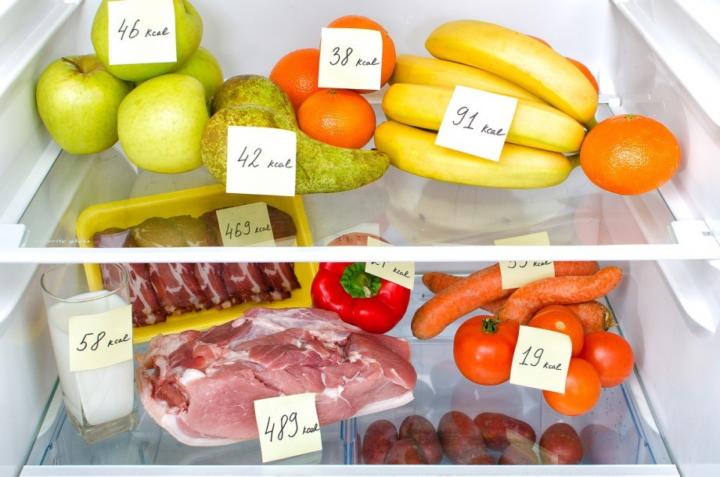
How many calories should you consume to lose weight?
You can calculate your calorie needs in different ways: if there is little excess weight, then count immediately towards your ideal weight; if there is a lot, then count towards an intermediate goal. You can also calculate your current weight taking into account your calorie deficit. These methods are used in dietetics and are good in their own way. Knowing your ideal weight, it is easier to control your own volume and get rid of extra pounds, but it is easier to adjust your diet for your current weight. Choose a more convenient option for calculating your daily calorie needs.
Calorie calculation for target weight (if you are slightly overweight)
So, in order to achieve the ideal weight for you, you need to adhere to the daily amount of calories that is necessary to maintain your ideal weight.
What is your goal? ________ kg
Multiply this weight by:
- 27 – If you do not play sports at all and your work does not involve physical labor;
- 29 – If you occasionally play sports (maybe play tennis or swim in the pool on weekends);
- 34 – If you exercise regularly (swim, run or walk for half an hour to an hour at least 3-4 times a week);
- 37 – If you play sports almost every day and quite intensely;
- 42 – If you play sports every day and very intensely or are involved in heavy physical labor at work.
For example:
I want to weigh 70 kg. However, I don’t play sports. Then:
70 x 27 = 1890
That is, in order to weigh 70 kg I need to consume no more than 1890 kcal per day, while preferably moving or doing fitness every day.

Calorie calculation for intermediate target weight (if there is a lot of excess weight)
If you have a lot of excess weight, do not immediately set yourself a final goal, set intermediate ones. If you weigh 80 kg, then when calculating your daily calorie intake, focus on a target weight of 75 kg, even if your final goal is 50 kg. Accordingly, calculate the daily calorie intake for intermediate weight. Why do this? And so that there is room to reduce calories further. Imagine you have reduced your calorie intake to your ideal weight. For the body, this is a lot of stress, starvation. Of course, at first he will give well, but very soon he will decide that he himself needs fat, and will not only stop losing weight, but will also go into saving mode. Therefore, you need to consume your daily calorie intake at your ideal intermediate weight.
Calorie calculation based on actual weight
There is also the option of consuming calorie intake based on your current weight with a calorie deficit of 10-15%. That is, you calculate the calorie intake based on your current weight:
How much do you weigh now? ________ kg
Multiply this weight by:
- 30 – If you lead a sedentary lifestyle (at home, office work, home again);
- 31-37 – If you train 3 to 5 times a week (gym training, group classes). The more often and more intensely you train, the higher the number you choose;
- 38-40 – If you lead an active lifestyle (work out daily or your job involves physical activity);
- 41-50 – If you play sports 15-20 hours a week or your job involves heavy physical labor.
The resulting figure must be adjusted taking into account the goal. If the goal is to lose weight, then subtract 10-15% from it.
For example:
I weigh 70 kg and go to group classes three times a week. Then:
70 x 31 = 2170
2170 — 10% = 1953
That is, if I now weigh 70 kg, then I need to reduce my calorie intake by 10%, which will be no more than 1953 kcal per day.

Recommendations for calculating calories for current weight
Nutritionists advise first focusing on a deficit of 10%, but switching to proper nutrition, excluding sweet, fatty and starchy foods from the diet. As mentioned above, at the beginning of losing weight, the body willingly gives up weight, but then the process slows down. By starting to lose weight with a 10% deficit, you will give yourself some wiggle room in case your weight loss slows down.
Which way is better?
Each method has its supporters. Calculating your target weight allows you to always stay focused on losing weight and not overeat. And calorie content calculated for actual weight is easier to adjust - you may not reach the target weight when the actual weight allows you to more accurately determine the current needs of the body.
How to correct results
If you are not losing weight with the calculated amount of calories, reduce your daily diet by 100 calories and increase physical activity by the same amount. Monitor your weight in this mode for a week. If you have at least 100-200 grams of “plumb”, stay another week in this mode and so on until the weight stays the same for 2 weeks in a row. Why two weeks and not one? Yes, because in the first week, maybe you just ate something extra and didn’t notice, or some other physiological factor influenced it, etc.
Be honest with yourself, keep a weight loss diary, track your caloric intake and try to be more active than you are now. Read food labels more carefully. As a rule, information is given for 1 serving or per 100 grams. Compare this to how much you actually consumed, perhaps 2 or more servings.
After two weeks, you can again apply the “reduce your daily diet by 100 calories and increase physical activity by the same amount.”

Why can't you lose weight quickly?
Remember that you cannot lose weight quickly, especially for those who are severely obese. Why? Yes, because with obesity, our internal organs are often also lined with fat, which supports them. If you lose weight slowly - 2-4 kg per month, then your organs will quietly release fat and nothing terrible will happen, they will feel better. If you lose weight suddenly, the fat support for your organs will disappear abruptly and you may experience organ prolapse. It's very scary. Don't let this happen.
Author: Ekaterina G. (nutritionist, fitness blogger) (especially for) Copying this article in whole or in part is prohibited.
Weight correction
Systematic consumption of calories less than the daily norm promotes weight loss and weight correction, especially if you combine a diet with sports activities. The daily calorie intake for a woman when losing weight is 80% of the usual per day.
The same indicator is used when losing weight, if you need to calculate the daily calorie intake for men. For harmless weight loss, nutritionists advise reducing the calorie content of food gradually. If the norm of kilocalories per day is 2000, then using 1600 kcal per day, you can achieve gradual weight loss.
The norm of kilocalories per day for men to maintain weight is 1800 kcal. It is not recommended to reduce this value below to avoid health problems. The daily calorie intake for weight loss depends on the individual intake of a particular person.
The required nutrients must be contained in the exact ratio:
- proteins – 30%;
- carbohydrates – 50%;
- fats – 20%.
With classic weight loss, all these components should be present in the diet of any person. The lack of one of these components will negate all efforts. You need to plan your daily diet taking into account physical activity, and then your body will delight you with beauty and grace for a long time!
Daily calorie intake for men, women and children
All these categories of people have their own needs in terms of quantity and quality of food consumption. In children, the ratio of body weight to the food they eat is the highest. This is due not only to their physical activity, but also to the processes of intensive growth and development of the entire organism - the formation of the skeleton, internal organs and an increase in muscle mass.
After passing through the active growth phase, from 18 to 25 years, the need for energy and nutrients gradually decreases to the norm of an adult. At older ages (26-55 years) this need is stable. After 55 years, as a rule, a decline in all types of vital activity begins, and accordingly, the need for energy decreases.
To calculate the daily calorie requirement, nutritionists conducted numerous long-term observations. Empirically, they determined the intervals of the required caloric content of food consumed by different categories of citizens.
Daily calorie needs for men.
| Lifestyle | Age, years | ||
| 18 to 25 | 26 to 55 | over 56 | |
| Sedentary | 2400 | 2200 | 2000 |
| Moderately active | 2600—2800 | 2400—2600 | 2200—2400 |
| Active | 3000 | 2800—3000 | 2800—2400. |
Daily calorie requirement for women, kcal.
| Lifestyle | Age, years | ||
| 18 to 25 | 26 to 50 | over 51 | |
| Sedentary | 2000 | 1750 —1850 | 1700 |
| Moderately active | 2200—2300 | 2100—2200 | 1750—1850 |
| Active | 2500—2600 | 2300—2400 | 2000—2100. |
| Initial period of pregnancy | + 150 | + 150 | |
| Pregnancy after 14 weeks and during lactation | + 300 including activity (if twins + 500) | + 300 including activity (if twins + 500) | |
Daily calorie intake for children.
| Age | Calorie content of food, kcal |
| from 6 months to 1 year | 800 |
| from 1 year to 1.5 years | 1330 |
| 1.5-3 years | 1480 |
| 3-4 years | 1800 |
| 5-6 years | 1990 |
| 7-10 years | 2380 |
| 11-13 years | 2860 |
| boys 14-17 years old | 3160 |
| girls 14-17 years old | 2760 |
